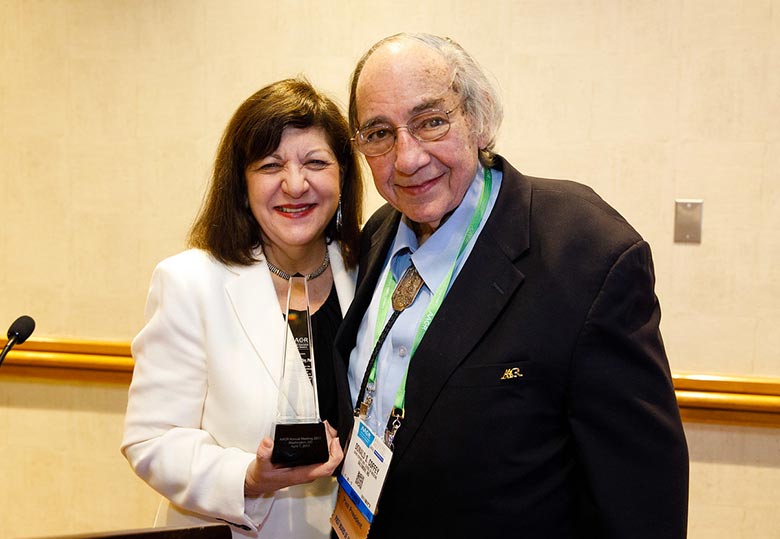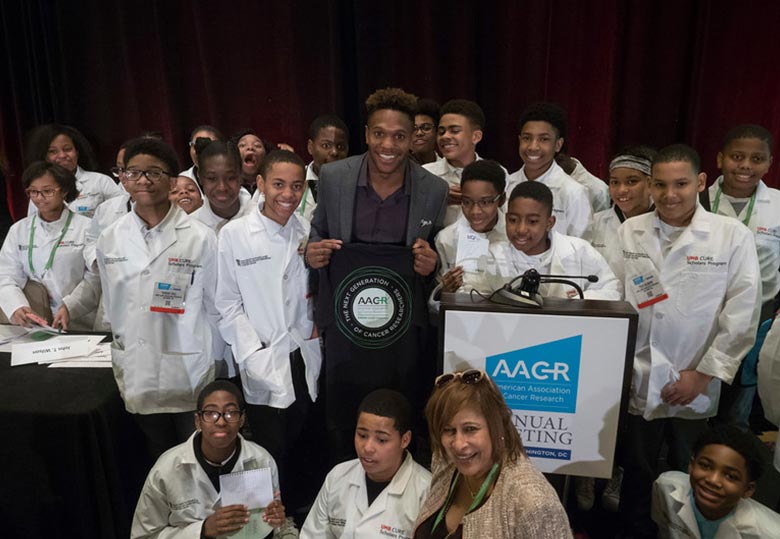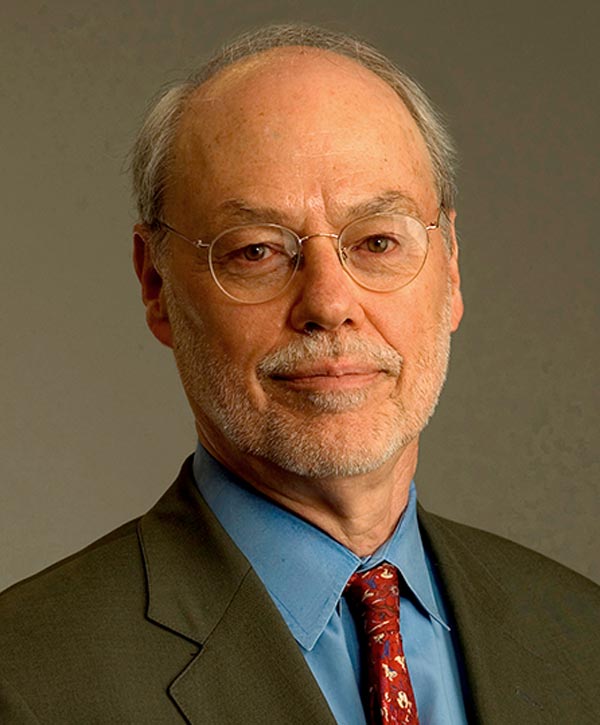Scientific Leadership: Catalyzing Collaborations
Progress against cancer requires the efforts of individuals and organizations on a large scale. The AACR acts as a catalyst for collaboration, identifying areas of critical need and bringing together scientists, clinicians, survivors, patients, advocates, and regulators to address them.
AACR Project GENIE
As the founding organization and leader of Project GENIE (Genomics Evidence Neoplasia Information Exchange)—a consortium of eight international institutions committed to aggregating their genomic data and linking it to clinical outcomes to advance cancer treatment—the AACR has overseen rapid progress in 2017 toward the project’s goal of using precision medicine to benefit cancer patients. In January, the project team publicly released its first dataset, consisting of nearly 19,000 tumor sequences and associated limited clinical data covering 59 major cancer types. In November, another 7,900 tumor sequences were added to the public domain registry, and another release planned for January 2018 will expand the number of tumor sequences in the public domain to 39,600. While the tumor types with the largest cohorts in the registry are non-small cell lung cancer, breast, and colorectal, these data releases significantly increased the cohorts for glioma and melanoma, thereby expanding the range of clinical questions that can be answered by the dataset.
The expansion of the AACR Project GENIE registry was accompanied by an acceleration of activity in 2017. Consortium members discussed the initial data release at a symposium on “Pan-cancer Genomic Analysis” at the AACR Annual Meeting 2017 in April, and a landscape analysis for the project was published in the August issue of the AACR journal Cancer Discovery. The registry has already begun yielding results, as two sponsored clinical studies were completed by the end of the year and are scheduled for presentation and publication in 2018. The consortium continues to grow with the dataset, as a total of 22 international institutions submitted applications to join the project in 2017. Led by the AACR, consortium members approved the addition of ten new participating national and international institutions, with additional participants expected to join by the end of 2018. As Project GENIE continues to scale up under the AACR’s leadership, it moves closer to delivering on the promise of precision medicine for all cancer patients.
Joint Statement on Cancer Health Disparities
In 2014, the AACR worked with the American Cancer Society (ACS), the American Society of Clinical Oncology (ASCO), and the National Cancer Institute (NCI) to form a think tank to address the disparities in health care access and outcomes that exist within many populations. The participants identified the lack of a shared research agenda in the disparities research community as a major obstacle to the reduction of cancer disparities at the population level. To overcome this obstacle, the think tank members committed to developing a joint statement that would summarize the current state of disparities research, identify research priorities to advance the field, and recommend the most effective methodologies to achieve those priorities.
In July 2017, the efforts of the think tank came to fruition with the publication of joint statement on “Charting the Future of Cancer Health Disparities Research.” The goal of the statement—which was published in the AACR journal Cancer Research and simultaneously published in CA: A Cancer Journal for Clinicians, in the Journal of Clinical Oncology, and on cancer.gov—was to “promote cooperation among investigators in all areas of the cancer health disparities research community, to ensure that cancer research benefits all populations and patients regardless of race, ethnicity, age, gender identity, sexual orientation, socioeconomic status, or the communities in which they live.”
AACR Publishes First Set of Screening Recommendations Emerging from Childhood Cancer Predisposition Workshop
The primary goal of the AACR Pediatric Cancer Working Group’s Childhood Cancer Predisposition Workshop, held in October 2016, was to provide pediatric clinicians with standard approaches to the surveillance of children affected by cancer predisposition syndromes. The workshop participants achieved that goal in 2017 with the publication of the first-ever consensus screening recommendations for the 50 most common syndromes that predispose children to the development of cancer in their first 20 years of life. The recommendations were published in a series of 18 articles in the AACR journal Clinical Cancer Research and were made freely available to provide clinicians with a detailed roadmap to prevent, intercept, and cure pediatric cancers.

Scientific Working Groups: Building Community, Promoting Progress
In 1999, the AACR Board of Directors established the Molecular Epidemiology Group (MEG), the organization’s first scientific working group. The mission of MEG was to foster and strengthen team-based, trans-disciplinary research in order to develop a more integrated understanding of cancer etiology and outcomes in human populations.
Over the next two decades, the AACR established several more working groups to promote progress in fundamental or emerging areas of cancer research. These working groups create communities of interest around their areas of inquiry, building working relationships and fostering collaboration in each field.
Chemistry in Cancer Research (CICR): International Outreach
The mission of the CICR Working Group is to advocate the critical role of chemistry in the treatment of cancer and to increase the understanding of chemistry among cancer researchers. The group’s pursuit of this mission reached across the globe in November 2017, as the CICR leadership organized its first Town Hall meeting at the New Horizons in Cancer Research conference in Shanghai, China. In addition to providing a focused networking opportunity for attendees interested in cancer chemistry, the session included two chemistry-focused lectures from scientists working in the pharmaceutical and contract research industries.
Pediatric Cancer Working Group (PCWG): Special Conference
PCWG provides a forum for communication and collaboration among basic, clinical, and translational researchers in academia, industry, and government on all aspects of pediatric cancer research. In pursuit of that goal, PCWG members worked with the AACR Program Development staff to develop a special conference on “Pediatric Cancer Research: From Basic Science to the Clinic.” Held in December, the meeting was the third special conference since 2013 to be organized in partnership with PCWG. Nada Jabado, MD, PhD—a member of the PCWG Steering Committee—and fellow cochairs Peter C. Adamson, MD, and Charles W. M. Roberts, MD, PhD, developed a program that featured cutting-edge research in epigenetics, genomics and clinical trials, immunotherapy, pediatric cancer modeling, and targeted therapeutics.
Science Education, Career Development, and Continuing Medical Education
In 1993, the AACR established the Science Education Committee (later renamed the Career Development Committee) to recruit future generations of cancer researchers through outreach to undergraduate and high school students. The committee launched its first initiative, the Special Program for High School Students, at the AACR Annual Meeting in 1996. That next year, the committee’s outreach expanded to undergraduates with the establishment of the AACR-Thomas J. Bardos Science Education Awards for Undergraduates (later renamed the AACR Undergraduate Scholar Awards).
Nearly twenty-five years later, the AACR continues to foster the education and career development of the next generation of cancer scientists—ensuring that the cancer workforce remains robust and ready to translate today’s discoveries into tomorrow’s treatments and cures.
AACR Cancer Career Clinics
In September, in recognition of National Postdoc Appreciation Week, the AACR organized two events in its hometown of Philadelphia to help postdoctoral students prepare for the next phase of their careers. At these Cancer Career Clinics, which were held at the University of Pennsylvania and Thomas Jefferson University, AACR staff scientists worked with postdoctoral students to develop their resumes and to answer their questions about traditional and nontraditional career paths in cancer research.
20TH Anniversary of the AACR Undergraduate Scholar Awards
Since their launch in 1997, the AACR Undergraduate Scholar Awards have provided promising undergraduate students with the motivation and mentorship to pursue a career in cancer research. These awards enable third-year undergraduate students to attend the AACR Annual Meeting for two consecutive years, inspiring them to consider cancer science as they approach a critical decision point in their professional journey.
At the Annual Meeting, the undergraduate program included a celebration of the 20th anniversary of the undergraduate scholar awards and of the AACR’s commitment to students and early-career scientists. Award recipients and mentors from previous years attended the celebration to acknowledge the program’s impact on their careers and on the cancer workforce. During the ceremony, AACR CEO Margaret Foti, PhD, MD (hc), presented a special award to Past President Donald S. Coffey, PhD, FAACR (right), in recognition of his dedication to educating and mentoring young scientists.

Student Members: Expanded Outreach
The AACR comprehensively supports the cancer workforce, educating young students about careers in science in addition to supporting undergraduates and early-career scientists. In 2017, the AACR Special Program for High School Students introduced more than 400 students to the world of cancer research. The students attended lectures to learn more about the cancer problem, and more than 45 of them presented their recent work in the largest poster competition to date. This year, the AACR’s support of future researchers reached beyond high school. Middle school students in the University of Maryland-Baltimore’s CURE Scholars Program—which prepares promising students for careers in health care and research—attended the Annual Meeting, participated in the poster session, and experienced the excitement of the largest comprehensive cancer research meeting in the world.
Continuing Medical Education
The AACR provides physician-scientists and clinicians with a wide range of opportunities to maintain their competence and incorporate new knowledge into their practice. As an ACCME-accredited provider, the AACR offered CME credit at 16 different meetings in 2017, including eight special conferences, three joint conferences, two workshops, one joint providership activity, and the Annual Meeting. AACR journals provided another educational resource, offering credit to investigators for reviewing manuscripts. A total of 3,054 researchers and clinicians claimed CME credit from the AACR in 2017, ensuring that caregivers apply the full spectrum of basic, translational, and clinical cancer science to improving the lives of their patients.

Meetings and Educational Workshops
The first AACR special conference, "Gene Regulation and Oncogenes," was held in 1988. Chaired by Phillip A. Sharp, PhD, FAACR—an AACR member who later received the Nobel Prize—the goal of the conference was to focus the attention of basic and clinical investigators on the relationship between the transcription of genes and cancer. In the nearly thirty years since that first focused conference, AACR meetings and educational workshops have expanded around the world and into every area of scientific inquiry.
AACR meetings and workshops continue to highlight emerging areas of cancer research, foster the detailed study of specific disease sites, and provide critical training to early-career scientists. A total of 21 meetings and seven workshops were convened in nine countries in 2017, bringing investigators together to work on critical aspects of the cancer problem. For example, the Tenth AACR Conference on The Science of Cancer Health Disparities, held in October 2017, applied innovative science to the disproportionate burden of cancer-related suffering and death on racial/ethnic minority and underserved populations. The conference gathered researchers, health care providers, survivors, patient advocates, and policy makers to identify the social, environmental, and biological determinants of cancer disparities and to develop strategies to eliminate these inequities.
As the AACR acknowledged its 110th anniversary in 2017, one of its premier meetings--the San Antonio Breast Cancer Symposium (SABCS)—celebrated its 40th anniversary in December. SABCS had already built a reputation over its first three decades as leading forum for the state-of-the-art information on breast cancer research before the AACR entered into a collaboration with UT Health Science Center San Antonio and Baylor College of Medicine to co-sponsor the symposium in 2008. Over the last ten years, the AACR’s breadth of expertise in basic, translational, and clinical cancer research has helped develop a balanced program that covers the full spectrum of breast cancer science and medicine.

2017 Workshops
![]() Meeting Held outside U.S.
Meeting Held outside U.S.
![]() AACR-AORTIC WORKSHOP: CAPACITY BUILDING FOR CANCER RESEARCH IN AFRICA
AACR-AORTIC WORKSHOP: CAPACITY BUILDING FOR CANCER RESEARCH IN AFRICA
January 17-18; Cape Town, South Africa
Cochairs: Timothy R. Rebbeck, PhD, Peter A. Jones, PhD, DSc, FAACR, and Frank McCormick, PhD, FRS, FAACR
![]() ECCO-AACR-EORTC-ESMO WORKSHOP ON METHODS IN CLINICAL CANCER RESEARCH
ECCO-AACR-EORTC-ESMO WORKSHOP ON METHODS IN CLINICAL CANCER RESEARCH
June 17-23; Zeist, The Netherlands
Codirectors: Stefan Sleijfer, MD, PhD, Lee M. Ellis, MD, Corneel Coens, MSc, and Emiliano Calvo, MD, PhD
INTEGRATIVE MOLECULAR EPIDEMIOLOGY WORKSHOP: BRIDGING CANCER BIOLOGY AND PRECISION MEDICINE
July 10-14; Boston, Massachusetts
Director: Thomas A. Sellers, PhD, MPH
Codirectors: Peter Kraft, PhD, and Lorelei A. Mucci, ScD, MPH
MOLECULAR BIOLOGY IN CLINICAL ONCOLOGY WORKSHOP
July 23-30; Snowmass Village, Colorado
Director: Charles L. Sawyers, MD, FAACR
Codirectors: Levi A. Garraway, MD, PhD, Mark W. Geraci, MD, and Jean Y. Tang, MD, PhD
ASCO/AACR METHODS IN CLINICAL CANCER RESEARCH WORKSHOP
July 29-August 4; Vail, Colorado
Codirectors: Jyoti D. Patel, MD, Patricia M. LoRusso, DO, and Meredith M. Regan, ScD
![]() CROUCHER SUMMER COURSE IN CANCER BIOLOGY
CROUCHER SUMMER COURSE IN CANCER BIOLOGY
August 7-11, 2017; Hong Kong
Codirectors: Irene O.L. Ng, MD, PhD and Tak W. Mak, PhD, FAACR
TRANSLATIONAL CANCER RESEARCH FOR BASIC SCIENTISTS WORKSHOP
October 22-27; Boston, Massachusetts
Codirectors: George D. Demetri, MD, Susan Band Horwitz, PhD, FAACR and Pasi A. Jänne, MD, PhD
2017 SCIENTIFIC MEETINGS
PRECISION MEDICINE SERIES:
OPPORTUNITIES AND CHALLENGES OF EXPLOITING SYNTHETIC LETHALITY IN CANCER
January 4-7; San Diego, California
Cochairs: René Bernards, DPhil, William C. Hahn, MD, PhD, and Louis M. Staudt, MD, PhD
![]() AACR INTERNATIONAL CONFERENCE:
AACR INTERNATIONAL CONFERENCE:
NEW FRONTIERS IN CANCER RESEARCH
January 18-22; Cape Town, South Africa
Cochairs: Peter A. Jones, PhD, DSc, FAACR, and Frank McCormick, PhD, FRS, FAACR
AACR ANNUAL MEETING 2017
April 1-5; Washington, DC
Program Committee Chair: Kornelia Polyak, MD, PhD
AACR-AHNS HEAD AND NECK CANCER:
OPTIMIZING SURVIVAL AND QUALITY OF LIFE THROUGH BASIC, CLINICAL, AND TRANSLATIONAL RESEARCH
April 23-25; San Diego, California
Cochairs: Jeffrey N. Myers, MD, PhD, Jennifer Rubin Grandis, MD, J. Silvio Gutkind, PhD, and Quynh-Thu Le, MD
ACCELERATING ANTICANCER AGENT DEVELOPMENT AND VALIDATION
May 3-5; Bethesda, Maryland
Chair: Gregory H. Reaman, MD
![]() AACR INTERNATIONAL CONFERENCE:
AACR INTERNATIONAL CONFERENCE:
TRANSLATIONAL CANCER MEDICINE
Held in cooperation with the Latin American Cooperative Oncology Group (LACOG)
May 4-6; São Paulo, Brazil
Cochairs: Carlos L. Arteaga, MD, FAACR and Carlos Gil M. Ferreira, MD, PhD
HEMATOLOGIC MALIGNANCIES:
TRANSLATING DISCOVERIES TO NOVEL THERAPIES
May 6-9; Boston, Massachusetts
Chair: Jonathan D. Licht, MD
Cochairs: Lucy A. Godley, MD, PhD, Louis M. Staudt, MD, PhD, and Catherine J. Wu, MD
ADVANCES IN SARCOMAS:
FROM BASIC SCIENCE TO CLINICAL TRANSLATION
May 16-19; Philadelphia, Pennsylvania
Cochairs: Irene L. Andrulis, PhD, Ping Chi, MD, PhD, Jonathan A. Fletcher, MD, and Lee J. Helman, MD
![]() INTERNATIONAL CONFERENCE ON MALIGNANT LYMPHOMA (ICML)
INTERNATIONAL CONFERENCE ON MALIGNANT LYMPHOMA (ICML)
June 14-17; Lugano, Switzerland
ICML President: Franco Cavalli, MD
Chair, Local Organizing Committee: Michele Ghielmini, MD
![]() EACR-AACR-SIC SPECIAL CONFERENCE 2017:
EACR-AACR-SIC SPECIAL CONFERENCE 2017:
THE CHALLENGES OF OPTIMIZING IMMUNO- AND TARGETED THERAPIES: FROM CANCER BIOLOGY TO THE CLINIC
June 24-27; Florence, Italy
Cochairs: Anton J. M. Berns, PhD, FAACR, Nancy E. Davidson, MD, FAACR, and Silvia Giordano, MD
![]() CRI-CIMT-EATI-AACR THIRD INTERNATIONAL CANCER IMMUNOTHERAPY CONFERENCE:
CRI-CIMT-EATI-AACR THIRD INTERNATIONAL CANCER IMMUNOTHERAPY CONFERENCE:
TRANSLATING SCIENCE INTO SURVIVIAL
September 6-9; Mainz/Frankfurt, Germany
Cochairs: Stanley R. Riddell, MD, Robert D. Schreiber, PhD, Christoph Huber, MD, and Guido Kroemer, MD, PhD
ADVANCES IN MODELING CANCER IN MICE:
TECHNOLOGY, BIOLOGY, AND BEYOND
September 24-27; Orlando, Florida
Cochairs: Cory Abate-Shen, PhD, Kevin M. Haigis, PhD, Katerina A. Politi, PhD, and Julien Sage, PhD
TENTH AACR CONFERENCE ON THE SCIENCE OF CANCER HEALTH DISPARITIES IN RACIAL/ETHNIC MINORITIES AND THE MEDICALLY UNDERSERVED
In association with the AACR Minorities in Cancer Research Council
September 25-28; Atlanta, Georgia
Cochairs: John M. Carethers, MD, Rick A. Kittles, PhD, Christopher I. Li, MD, PhD, and Electra D. Paskett, PhD
ADDRESSING CRITICAL QUESTIONS IN OVARIAN CANCER RESEARCH AND TREATMENT
October 1-4; Pittsburgh, Pennsylvania
Cochairs: Robert C. Bast, Jr., MD, Ursula A. Matulonis, MD, and Anil K. Sood, MD
TUMOR IMMUNOLOGY AND IMMUNOTHERAPY
October 1-4; Boston, Massachusetts
Cochairs: James P. Allison, PhD, FAACR, Carl H. June, MD, FAACR, Miriam Merad, MD, PhD, and Giorgio Trinchieri, MD
ADVANCES IN BREAST CANCER RESEARCH
October 7-10; Hollywood, California
Cochairs: Myles A. Brown, MD, Tak W. Mak, PhD, FAACR, Ramon E. Parsons, MD, PhD, and Laura J. van 't Veer, PhD
AACR-NCI-EORTC INTERNATIONAL CONFERENCE ON MOLECULAR TARGETS AND CANCER THERAPEUTICS
October 26-30; Philadelphia, Pennsylvania
Scientific Committee Cochairs: Antoni Ribas, MD, PhD, James L. Gulley, MD, PhD, and Charles Swanton, MD, PhD
![]() NEW HORIZONS IN CANCER RESEARCH
NEW HORIZONS IN CANCER RESEARCH
November 6-9; Shanghai, China
Cochairs: Nancy E. Davidson, MD, FAACR, Kornelia Polyak, MD, PhD, Chi Van Dang, MD, PhD, and Hongyang Wang, MD, PhD
PROSTATE CANCER:
ADVANCES IN BASIC, TRANSLATIONAL, AND CLINICAL RESEARCH
December 2-5; Orlando, Florida
Cochairs: Johann S. de Bono, MBChB, PhD, Karen E. Knudsen, PhD, Peter S. Nelson, MD, and Mark A. Rubin, MD
PEDIATRIC CANCER RESEARCH:
FROM BASIC SCIENCE TO THE CLINIC
In association with the AACR Pediatric Cancer Working Group
December 3-6; Atlanta, Georgia
Cochairs: Peter C. Adamson, MD, Nada Jabado, MD, PhD, and Charles W. M. Roberts, MD, PhD
SAN ANTONIO BREAST CANCER SYMPOSIUM
December 5-9; San Antonio, Texas
Codirectors: Carlos L. Arteaga, MD, FAACR, Virginia G. Kaklamani, MD, and C. Kent Osborne, MD